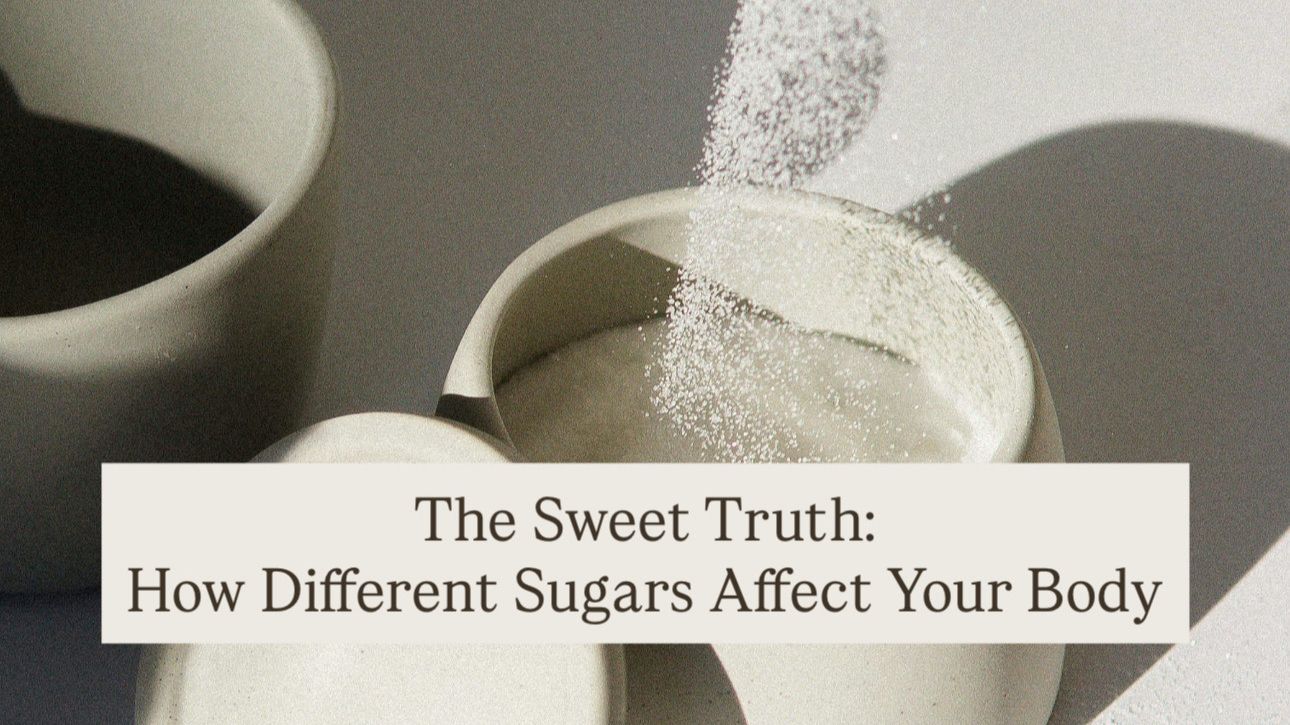The Sweet Truth: How Different Sugars Affect Your Body
Oct 03, 2025
When most people think of sugar, they think it’s all the same. But the truth is, your body doesn’t digest every sugar in the same way—and those differences matter when it comes to your energy, cravings, weight gain, and long-term health.
Let’s break down the types of sugar, how your body processes them, and what that means for your blood sugar and overall health.
What Is Sugar, Really?
At its core, sugar is a type of carbohydrate. Carbs are chains of sugar molecules, and depending on their size, they behave differently in your body.
- Monosaccharides (single sugars): glucose, fructose, galactose.
- Disaccharides (two sugars linked together): sucrose, lactose, maltose.
These simple sugars are the building blocks of more complex carbs, but each one impacts your body in unique ways.
How Your Body Processes Different Sugars
Here’s a breakdown of the major sugars and what they do inside your body:
- Glucose – Your body’s preferred fuel. It raises blood sugar quickly and triggers insulin release. Great for quick energy, but in excess it leads to insulin resistance.
- Fructose – Doesn’t raise blood sugar much directly. Instead, it’s metabolized in the liver. In small amounts (like fruit), it’s fine. In large amounts (like soda or processed foods), it overloads the liver and contributes to fatty liver disease and insulin resistance.
- Galactose – Found in dairy, paired with glucose to form lactose. Mild effect on blood sugar.
- Sucrose – Table sugar (half glucose, half fructose). You get both the quick spike of glucose and the liver load from fructose.
- Lactose – Milk sugar (glucose + galactose). Digestion depends on whether you have enough of the enzyme lactase.
- Maltose – Two glucose molecules bound together. Found in malted cereals, beer, malt vinegar, and foods made with malted barley. It breaks down quickly and spikes blood sugar fast. On labels, it might appear as malt syrup, malt extract, or malt sugar.
Categories of Sugar
Not all sugar is created equal. Here’s how different categories of sugar are made, how they work, and what they do in your body:
1. Naturally Occurring Sugars
Found in fruits, vegetables, and dairy. These sugars come packaged with fiber, water, vitamins, and nutrients that slow absorption and blunt blood sugar spikes. Whole foods are how nature intended us to consume sugar.
2. Refined Sugars
Extracted and concentrated from sugarcane, beets, or corn. Examples include table sugar, brown sugar, and high-fructose corn syrup. With all the fiber and nutrients stripped away, these sugars hit your bloodstream hard and fast, causing energy crashes, cravings, and metabolic stress.
3. Sugar Alcohols
Xylitol, erythritol, sorbitol, and mannitol. They’re only partially absorbed, so they provide fewer calories and have less impact on blood sugar. But the unabsorbed portion ferments in the gut and can cause bloating or diarrhea for some people.
4. Artificial Sweeteners
Aspartame, sucralose, saccharin. They’re calorie-free and hundreds of times sweeter than sugar. While they don’t raise blood sugar directly, they may alter gut bacteria, impact insulin sensitivity, and perpetuate sugar cravings.
5. Natural Low-Calorie Sweeteners
Stevia and monk fruit. Plant-based, calorie-free, and blood sugar-friendly. Generally considered safe, but they can keep the sweet tooth alive, making it harder for some people to retrain their palate.
Blood Sugar Response: Glycemic Index and Glycemic Load
To understand how sugar affects you, it helps to know two key concepts:
- Glycemic Index (GI): Measures how quickly a food raises blood sugar.
- Glycemic Load (GL): Considers both how fast and how much sugar a food delivers in a normal serving.
Here’s how different sugars stack up:
- Glucose: GI of 100 (the fastest).
- Fructose: Low GI, but burdens the liver.
- Sucrose: Medium GI—quick spike plus liver load.
- Lactose: Moderate GI—varies with tolerance.
- Maltose: Very high GI—almost as fast as glucose.
- Sugar Alcohols: Low to zero GI, but can cause gut issues.
- Artificial & Natural Sweeteners: Technically GI of zero, but can affect cravings, gut health, or insulin in indirect ways.
The takeaway: Foods with high GI/GL (soda, candy, pastries) spike your blood sugar, leading to crashes, cravings, and fatigue. Whole foods with natural sugars (fruit, dairy) have a much gentler effect because of the fiber, water, and nutrients they contain.
Practical Takeaways
- Read labels: Sugar hides under names like cane juice, malt extract, rice syrup, or agave nectar.
- Choose whole foods: Fruit, vegetables, and minimally processed foods are best.
- Limit refined sugars: They provide no nutrients and stress your system.
- Be strategic with alternatives: Stevia, monk fruit, or sugar alcohols can help, but they’re not a free pass.
- Listen to your body: Some people tolerate dairy or small amounts of fruit well; others don’t. Bio-individuality matters.
Final Thoughts
Sugar isn’t just sugar. The type matters—and your body reacts differently depending on the form it comes in.
If you want to improve your energy, stabilize your cravings, and support your metabolism, start small. Replace one refined sugar this week with a natural, whole-food option. You’ll be surprised how much better you feel when your blood sugar isn’t on a rollercoaster.
And if you’re ready to go deeper into building a lifestyle that works for you long-term, that’s exactly what we do inside Lifestyle School for Weight-Loss.
Join Lifestyle School for Weight-Loss, the step-by-step program designed to help you lose weight, feel confident in your body, and simplify healthy living. Learn how to use fasting, nutrition, and sustainable habits to create lasting results—all without the overwhelm.
Let’s do this together! 💪
Ready to Start Fasting the Right Way?
Get my "4 Steps to Getting Started Fasting the Right Way" guide for free! This quick, easy-to-follow resource will help you ease into fasting, avoid common mistakes, and feel confident on your journey to better health. Sign up now and start fasting with confidence! ✨
We hate SPAM. We will never sell your information, for any reason.
